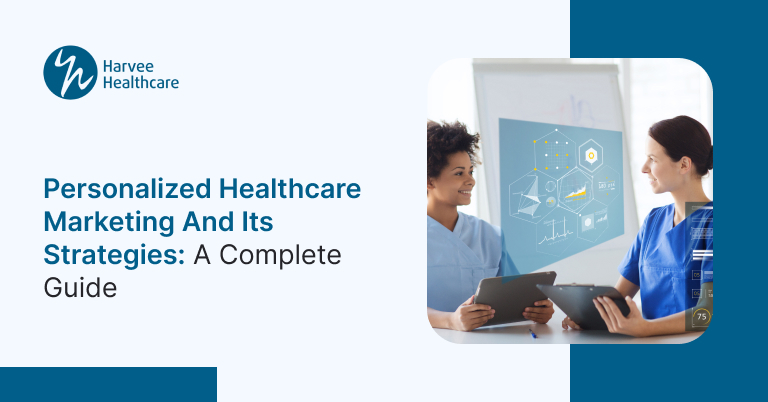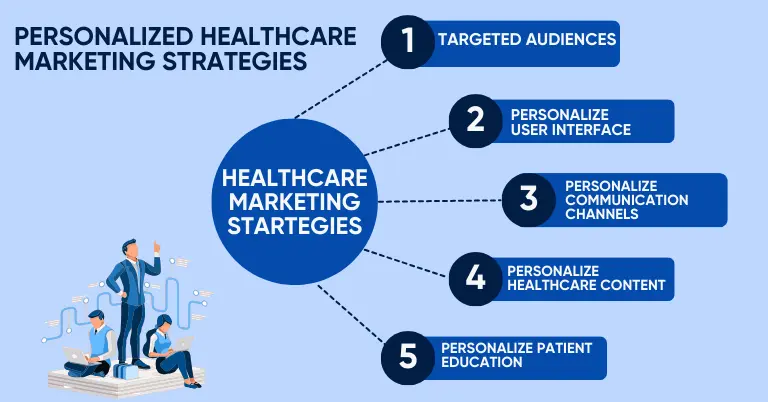
Personalized Healthcare Marketing and Its Strategies: A Complete Guide
Given their significant influence on patient engagement, satisfaction, and loyalty, patient experiences are essential in the healthcare industry. However, how can healthcare organizations apply personalized marketing plans while respecting the privacy and trust of their patients?
There is much more to personalization than just calling someone by name. It involves maintaining a thorough awareness of each patient’s distinct medical journey and personalizing communications to suit their need.
This blog explores the impact of personalization in healthcare marketing, studying strategies and breakthroughs that connect with people.
What is Personalization in Healthcare Marketing?
In the healthcare industry, personalized marketing refers to tailoring marketing initiatives to suit the particular requirements and preferences of each patient. This kind of marketing includes obtaining and examining patient data to learn more about their choices, behaviours, and state of health.
By doing this, healthcare professionals can interact with patients in a more relevant and focused way, which will increase patient engagement and, eventually, improve health outcomes.
For example: Personalized Dental Reminders
A clinic can boost appointments and make patients feel valued by sending customized reminders based on their past medical history, which encourages check-ups or post-care.
How Does Personalization Benefit Healthcare Marketing?
Every encounter, from a warm greeting at your healthcare facility to personalized bill explanations, is an opportunity to show that you sincerely understand and care about their health and well-being.
You can significantly increase patient satisfaction and engagement by using a tailored strategy, which will improve patient retention.
Improved Patient Experience: Personalized healthcare marketing enables you to go beyond the standard one-size-fits-all strategy by creating an environment where patients feel appreciated, understood, and sincerely cared for.
Enhanced Patient Engagement: When a message or email seems like it was written mainly for you, it has a more significant impact. That’s how customized content works its charm. It wins people over, strengthening the relationship between patients and medical professionals.
Increased ROI: Targeted campaigns provide more value for the money since they improve engagement and make better use of marketing resources.
Efficient Resource Allocation: You can better prepare when you are aware of someone’s demands. Healthcare companies can improve their offerings, which will benefit patients and streamline operations.
Positive Feedback: Patients frequently feel more at ease discussing their needs, preferences, and concerns with healthcare practitioners when they have a personalized point of contact.
Personalized Healthcare Marketing Strategies
In healthcare, personalization builds trust and fosters deeper patient relationships. So, it is essential to understand personalization in healthcare marketing.
Targeted Audiences:
To begin personalizing your marketing, divide your target audience into groups according to their needs, interests, and habits. This enables you to provide content and messaging that are specifically tailored to each group.
For example, a patient with diabetes visits the clinic for a regular check-up. A few weeks after their initial visit, they receive a follow-up email checking on their progress, offering additional resources, and inviting them to join a local support group for diabetes management.
Personalize User Interface:
Improve user interfaces by personalizing them based on user history and preferences. It can display relevant data, automatically fill out forms with known information, and include interactive features that make registering simple and smooth for people.
It is one of the ways of making people feel comfortable by making their appointments or follow-up check-up registrations easy online. It improves user experience and, at the same time, enhances patient retention.
Personalize Communication Channels:
Personalizing patient communication is one of the best ways to improve patient retention. Healthcare providers can send patients personalized content, appointment reminders, and necessary medical information by using email marketing.
Further improving user experience and engagement is the integration of personalization into SMS communications, mobile apps, and patient portals.
Using chatbots and virtual assistants to their full potential also reduces visits for patients and raises satisfaction levels by providing instant access to critical information and personal help.
Personalize Healthcare Content:
Personalization of healthcare content is essential for strengthening relationships with patients as well as improving performance. Personalizing healthcare content guarantees that the content is interesting, appropriate, and suited to each patient’s particular requirements.
Healthcare professionals can provide content that more deeply resonates with patients and assist them in making educated decisions about their care by having a thorough awareness of their particular health issues, preferences, and history.
Additionally, by encouraging patients to take charge of their health, personalized content can improve adherence to treatment and promote greater confidence in the healthcare professional.
Personalize Patient Education:
Using healthcare marketing, personalized patient education materials can be provided by healthcare professionals following a patient’s health issues, treatment plan, or diet plan.
For example, patients with diabetes can access a personalized dashboard with interactive content, a blood glucose monitor, and video tutorials designed explicitly for managing their condition through the patient portal in the healthcare app.

Personalization and Patient Retention:
Personalization is essential for creating long-lasting patient relationships in addition to promoting instant engagement and results. Healthcare practitioners can develop trust and loyalty by showing a sincere interest in their patient’s well-being and providing individualized care experiences.
According to a Healthgrades survey, improved health outcomes can result from personalized patient communication. Patients are more likely to stick to treatment plans and medical advice if they believe that their care is personalized.
Accenture’s research indicates that 91% of consumers are more willing to interact with brands that make recommendations and offers based on their interests, which is another proof of the influence of personalization.
This idea implies that individualized communications might significantly increase patient conversion rates when used in the healthcare industry.
Final Words:
Healthcare marketing is transforming thanks to personalization, which makes it possible for businesses to connect with people directly. Are you prepared to improve your healthcare marketing with sincerity and dedication? Explore Harvee Healthcare for more updates.
Frequently asked question
Personalized healthcare takes your medical history, lifestyle, and surroundings into account when determining the most suitable plan of treatment for you. It guarantees that the care you receive is customized to your needs rather than being general.
In order to help medical practitioners connect with the right patients, we at Harvee Healthcare customise marketing strategies to meet their specific needs. Our personalized strategy makes sure your practice gets noticed and expands successfully.
By providing customized experiences, personalized marketing enables companies to establish a closer connection with their customers. Customers feel valued, involvement increases, and results improve. It also raises the possibility of customer retention.
Search
Recent Post
Categories
- AI in Healthcare
- Content Marketing
- Dental
- dental Digital Marketing
- Google Ads
- Google my business
- Healthcare marketing
- Healthcare SEO
- Internet Marketing Tips
- Lead Generation
- Local SEO
- Patient Satisfaction
- pay per click
- Pharma Marketing
- Social
- Social Media Marketing
- Traffic
- Website
- Website Designing
Contact
Get in Touch With Us
Coimbatore Address
- 21/1, Periasubbanna Gounder Street, K.K.Pudur, Coimbatore, Tamil Nadu 641038.
- 098942 76263
- info@harveehealthcare.com

Chennai Address
- RMZ Millenia Business Park, Level 6, Phase II, Campus 4B Unit 602A, Kandancavadi, Perungudi, Chennai, Tamil Nadu 600096.
- 098942 76263
- info@harveehealthcare.com

Dubai Address
- Umm Sequeim 3, Jumeirah Rd Opposite Burj Al Arab, Villa #1 855 A Dubai.
- info@harveehealthcare.com

United Kingdom Address
- 3/2 Powderhall Rigg Edinburgh, United Kingdom EH7 4GA.
- info@harveehealthcare.com

Copyrights © 2025 harvee.co.uk











Leave a Reply